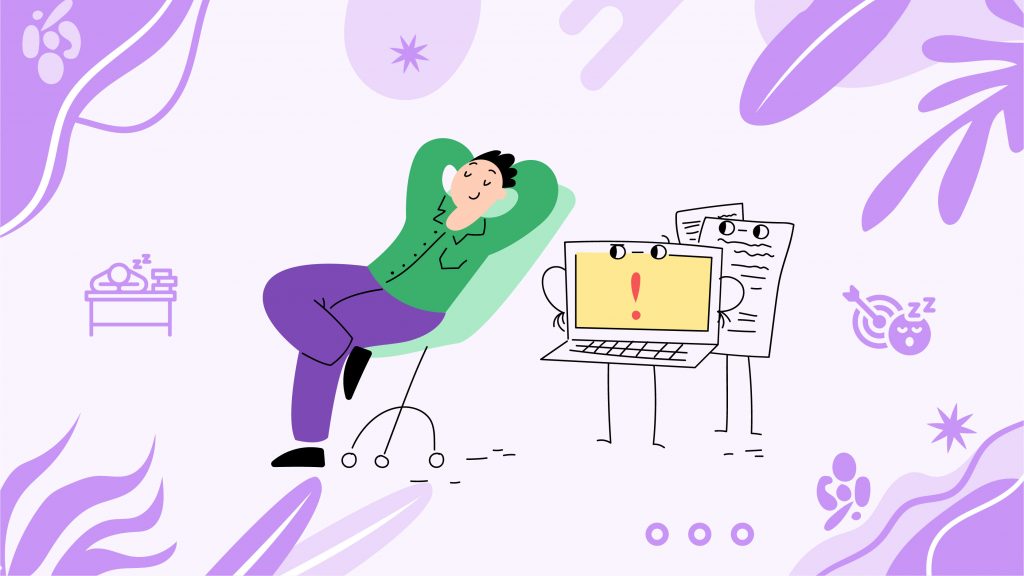Do you often feel lazy for no clear reason, accompanied by the frustration of being unproductive?
If so, you are not alone. We are all human beings, and it is natural for us to fall into the pitfall of laziness. It is okay not to add to our productivity. There are days when we want to be couch potatoes. However, if it starts becoming a regular habit, it might be time to take action and make a change.
The good news is that you can work around your laziness. On a closer look, you’ll know that the roots of laziness run deep. It isn’t just about your unwillingness to act; it often stems from underlying factors like fear of failure, perfectionism, or even burnout.
What is Laziness?
Laziness is a lack of willingness to do an activity or task despite the ability to do it. When we lack the inspiration and motivation to do a task and come across with a laid-back attitude, it is usually a sign of laziness.
We often think laziness is just a result of our mood, but there are deeper reasons behind it. Procrastination can be a sign that we simply lack the energy to tackle a task. Alternatively, it may signal that, while we’re capable and energetic, something psychological—like a fear or mental block—is holding us back from moving forward.
This hesitation could stem from fear of failure, lack of clarity, or feeling overwhelmed by the task at hand.
Unmasking the True Causes of Laziness
- Fear of Failure
When we have a hidden fear of failure, we often procrastinate or feel lazy. This underlying fear can make us avoid a task instead of tackling it head-on.
- Burnout and Exhaustion
When our physical and mental energy is depleted, we might mistake it for laziness. This is when it becomes important to investigate the actual reason behind laziness and address it from the root.
- Lack of Clarity
When we’re unsure about what needs to be done, it’s easy to feel stuck and unmotivated. Without clear steps or goals, even small tasks can feel confusing.
- Feeling Bored and Monotonou
Another reason to feel lazy is when we feel bored and monotonous following a strict routine. In such instances, a little creativity and a change of pace can help break the cycle.
Ways to Overcome Laziness
You’ll be surprised to note how making little changes can give you the power over laziness. Gamify your tasks and see the difference in your energy.
When you turn your tasks into goals and give yourself the points after completing it, you’ll notice laziness warding away like anything. Similarly, playing music to add to your motivation, or, using means like reverse psychology can work wonders when you are determined to beat the laziness.
#1: Set Clear Goals
Breaking tasks into smaller steps makes them more manageable and helps prevent laziness. When you’re clear and specific about your goals, it’s easier to stay motivated and make steady progress.
For example, instead of setting a vague goal like, “I want to be successful,” try something more focused, like “I want to become a successful business owner.” This clarity makes it easier to identify actionable steps to reach your goal. You can break it down even further—such as researching your industry, creating a business plan, or networking with potential clients—to make consistent progress.
For quick motivation and progress, you can write your daily actions in a daily planner.
#2: Eliminate Distractions
To get rid of the laziness, eliminate the distractions around you. You might be spending hours watching TV, scrolling through social media, playing games, and so on. When you curb your behavior of giving away your time and attention to distractions, you will quickly move to the other side of being unproductive.
Start by putting away your phone when engaged in a task. This will increase your focus and productivity at once. Additionally, you can use noise-cancellation headphones to maintain your focus. Apart from these, creating a designated work environment is an add-on when it comes to boosting your concentration and reducing distractions.
#3: Use 5-minute Rule
Breaking the cycle of laziness becomes easier when we become playful and tactful. Engaging in the same tasks and routine week after week can be tedious and add to monotony. This is when taking little steps toward breaking the monotony pays off.
Next time you feel lazy, try practicing the 5-minute rule. This rule states that if any task takes five minutes or less, do not delay it and do it right away. This will set a strong foundation for cultivating discipline and other positive attributes within your daily routine. By tackling small tasks immediately, you build momentum and develop a habit of taking action, which gradually reduces laziness and strengthens your sense of accomplishment and discipline.
#4: Practice Self-Compassion
If you think you can overcome laziness by being hard on yourself, you are mistaken. Understand that if you constantly feel lazy, there is a deep-rooted reason behind it. It could be anything from feeling uninspired to lacking the clarity of what needs to be done. Once you find the reason behind your laziness and work on it, you’ll notice a significant improvement in your moods and feelings.
Try to approach it with kindness. One effective way of overcoming laziness is to practice self-compassion. Take steps to be polite and accommodating toward yourself. Give yourself the room to be unproductive. When you do this, it will help you build a healthy equation with yourself, and you’ll be able to achieve more without being too hard on yourself.
#5: Reward Yourself
Sometimes, a little trick of rewarding yourself for the tasks you’re least interested in can get the ball rolling. Often, feeling lazy stems from not feeling motivated. Sparking motivation by offering yourself a simple reward can do wonders. It doesn’t necessarily have to be a bigger bait. It could be enjoying your favorite snack, going to your favorite place, or giving yourself the luxury of letting loose and relaxing once you finish the tasks.
The reward system will keep you motivated to move towards your set goals. But don’t make it the only reason to act. It can also backfire if you rely solely on rewards for motivation. Instead, view rewards as a bonus for your efforts, not the main driving force. This way, you build intrinsic motivation and learn to enjoy the process itself, making it easier to stay committed to your goals in the long run.
Practical Tips to Overcome Laziness
- Break your tasks into smaller and manageable steps. When you lay out a clear course of action and know what’s lying ahead, you are less likely to feel lazy.
- Engage in positive self-talk. It is often the result of negative self-talk that we feel uninspired, lazy, and doubt our ability to accomplish tasks.
- Prioritize self-care. When you engage in a healthy routine and take sufficient time to rest and relax, you feel energized to undertake your tasks without feeling lazy.
- A reward system works wonders with laziness. When you reward our small acts, you naturally keep yourselves motivated and align with the habit of doing every task on time.
- Practicing self-discipline is another way of dodging laziness. When you make it a habit to follow discipline in everything you do, you naturally avoid being lazy.
- Follow the ‘five-minute rule.’ If a task takes five minutes or less, choose to complete it rather than reserve it for later.
- Getting rid of distractions is a key step in beating laziness. When you remove the things that pull our focus away, it becomes much easier to stay on track and finish the tasks.
- Try to visualize the outcome. It will help you in two ways. First, it will strengthen your focus, and second, it will give you the positive feeling of completing the task well in advance.
Final Thoughts
Overcoming laziness often starts with understanding what’s really holding us back. By recognizing the fears and doubts that trigger procrastination, we can tackle tasks with renewed confidence and purpose.
Following simple steps like setting clear goals, eliminating distractions, practicing self-compassion, and rewarding yourself can help you build momentum and stay motivated. These strategies make overcoming laziness easier, empowering you to make steady progress toward your goals and create lasting positive habits.
Embracing small steps forward helps us break free from the cycle of avoidance and move closer to our goals with ease.
FAQs
Laziness often stems from factors like fear of failure, lack of clarity, or absence of inspiration. We tend to blame ourselves for being lazy when, in reality, we may just be feeling overwhelmed or unmotivated. That’s why it’s important to identify the actual cause of our laziness before dismissing it as mere unwillingness to work.
The easiest way to break out of the laziness loop is to never reserve any task for later until it sits last on your priority list. When we cultivate the habit of doing everything right away, we sign up for a life of momentum and progress.
Yes. Sometimes, the actual reason behind our laziness is the feeling of being drained. When you feel lazy, it is crucial to figure out why. And if it turns out to be physical and mental exhaustion, it’s better to soothe it with self-care and address the actual concern to combat burnout.
Consistency is the key. If you try to maintain consistency in everything you do, you will likely feel motivated and inspired. Following one simple trait of consistency will help you remain aligned with positive habits and stay focused on your goal.
To stop procrastinating, you must step outside perfectionism and set deadlines for the tasks you want to achieve. For this, you can use to-do lists, productivity apps, or even accountability partners. Break big tasks into smaller and manageable chunks and create an organized work environment to ensure that you meet them all.





















